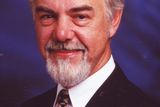Paddy O'Flaherty, BBC broadcaster with voice that 'could make phone book sound lyrical'
Tributes flowed yesterday after the death of one of Northern Ireland's best-loved broadcasters, Paddy O'Flaherty. Colleagues shared their memories of a consummate professional, accomplished musician and fanatical angler


One of the most instantly-recognisable voices in Northern Ireland broadcasting has been silenced with the death of veteran BBC presenter and reporter Paddy O'Flaherty, who was also a popular country and western musician.
And the breadth of Paddy's prodigious talents has been underlined by the wide range of glowing tributes paid to him by fellow journalists, political leaders and country stars.
Paddy, who was from the Ballyhackamore area of east Belfast, died after a short illness, which it's understood had only been diagnosed a few days ago.
News of his passing was broken on Radio Ulster's Good Morning Ulster programme, where he'd been a renowned cornerstone of their award-winning output for decades.
Noel Thompson announced Paddy's death near the end of yesterday's GMU.
He told listeners that he was saddened to have to share the news of the death of Paddy, whom he described as a very esteemed colleague whose extraordinary enthusiasm could make the most tedious story sound like an exciting one.
Co-host Karen Patterson was clearly distressed and said there was no one like him. She said he was revered as a journalist of the highest calibre, but she added: "What I remember most is his decency and his kindness to a new reporter in the news and current affairs stable here in the BBC. He showed me the ropes and brought out the sheer enjoyment of the job."
Paddy was 73, but he was still broadcasting on GMU until recently and, indeed, his passion for the job was illustrated by his contribution last week to a discussion about telephone boxes, which have become almost redundant in Northern Ireland thanks to the mobile phone revolution.
Karen Patterson said Paddy had regaled listeners with stories of blossoming romances and community tales that began in the old telephone boxes.
She added: "He'd even gone to his home area and checked out what boxes were still in existence."
It was to be Paddy's last-ever item on GMU, but his distinctive voice resonated across the Radio Ulster airwaves yesterday as excerpts of his broadcasts were played throughout the day.
Talkback presenter William Crawley said the shock in the BBC newsroom about Paddy's death yesterday morning was palpable. "I saw him a week ago and he was in fit form," said William.
Paddy was described as a "legend" by BBC reporter Mervyn Jess, who's also an official in the National Union of Journalists and who said it had been a privilege to have worked with him during his decades in the broadcasting industry.
The editor of BBC Northern Ireland radio current affairs and digital news, Adam Smyth, said: "Paddy was one of the best radio broadcasters these islands have ever produced, a tremendous character and a man whose name was synonymous with BBC Radio Ulster."
Paddy started his career as a newspaper reporter with the Irish News, where UTV presenter Paul Clark worked alongside him as a novice journalist.
He said: "As a rookie, Paddy took me under his wing. I am really saddened to hear about his death."
Paul recalled how Paddy had played a lament to his late wife at her funeral. "There wasn't a dry eye in the church," he added.
Former UTV broadcaster Mike Nesbitt, who's now the leader of the Ulster Unionist Party and who was a one-time colleague of Paddy O'Flaherty, tweeted: "Great voice. Great journalist. Great man."
Tributes to Paddy came from other political leaders as well. First Minister Arlene Foster said he was "a gentle person" and her DUP colleague Ian Paisley MP said he was one of the most courteous and decent people he'd ever had the honour to meet.
SDLP MP Mark Durkan said Paddy was an engaging broadcaster and a gentleman.
Political journalist Gareth Gordon said he enjoyed nothing more than being on a late shift with Paddy "in storytelling mode", adding: "He could make the phone book sound lyrical".
The head of BBC News NI, Kathleen Carragher, called Paddy a "fantastic radio broadcaster", who could bring the listener to the heart of any story.
Paddy was acknowledged as a journalist who could add a warmth and lightness of touch to the softer side of news across Northern Ireland, but it was as a reporter throughout the Troubles that he stamped his undoubted authority.
One of Paddy's former news editors at the BBC, Michael Cairns, said he was one of the reporters of the Troubles era in Northern Ireland, adding "To be a good Troubles' reporter, you needed courage, empathy and storytelling ability. And Paddy had everything."
He said that Paddy's reports in January 1992 from Larry's Bar in Belfast after bomb attacks in the area helped win Good Morning Ulster a Sony Gold award.
He also revealed that, after the IRA dumped the bodies of three men - Gregory Burns, John Dignam and Aidan Starrs - they had shot as informers in south Armagh in July 1992, Paddy went on his own to the border area late at night and actually discovered one of the corpses.
"The Army and police wouldn't go near it," said Michael, "but Paddy produced this piece which was heartbreaking, but professional, describing what he saw. That was Paddy to a tee. He was one of the great chroniclers of that time of madness we all went through."
Another ex-colleague, Wendy Austin, concurred. She tweeted: "Very sad that my lovely colleague Paddy O'Flaherty has passed away. One of nature's gentlemen, wonderful voice, great reporter. We'll miss him."
Fellow broadcaster John Bennett said Paddy O'Flaherty's voice was unforgettable and unmistakeable. "It started about his ankles somewhere and it had marinated itself as it came up and when it came out through those tonsils you could believe anything that Paddy had said to you. His was the voice of authority."
He said that Paddy was a "complete professional".
He recalled how Paddy was clearly feeling unwell during one live early morning broadcast after "a bad curry" the night before, but used the time during a 35-second promotional break to sort out his problems. "He reached under the table and lifted a wastepaper basket to 'call for Hughie' and went on with the next link. The listeners didn't know anything had happened."
But, away from the bombs and bullets, Paddy O'Flaherty was also an accomplished musician, playing the country fiddle with a bravura that earned him plaudits from his peers.
He also hosted country music programmes on Downtown Radio and later moved to the BBC with a radio show called Country Club and the TV production Make Mine Country.
International stars like Johnny Cash, Willie Nelson and Loretta Lynn regularly appeared on his programmes.
Hugo Duncan said Paddy loved playing country music and knew everything about it, adding: "He was a real entertainer. We were lucky that Paddy came up with us for an outside broadcast on Radio Ulster from the Royal Victoria Hospital on Christmas Eve and his fiddle-playing brought the house down.
"He was great craic. I couldn't believe it when I heard the awful news this morning."
Paddy was also a fanatical angler and even became the fishing correspondent of the Saturday morning Radio Ulster programme Your Place and Mine.
The former editor of the Press Association in Ireland, Deric Henderson, said: "Paddy was a very solid journalist, who could make even the most apparently trivial story sound fascinating.
"I used to marvel at the scope of stories that he covered on Good Morning Ulster. One minute he would be talking about a farming controversy and the next he would be reporting on the latest business news."
Join the Belfast Telegraph WhatsApp channel
Stay up to date with some of Northern Ireland's biggest stories


